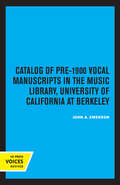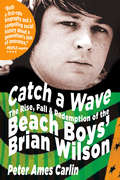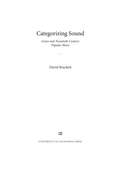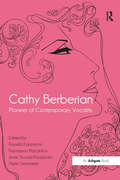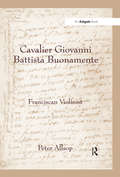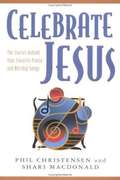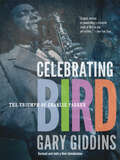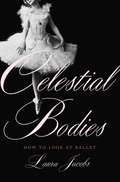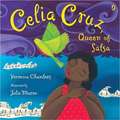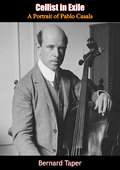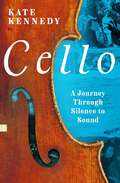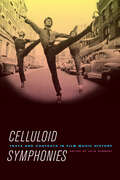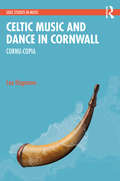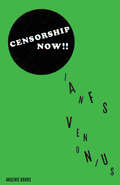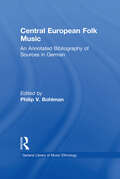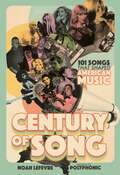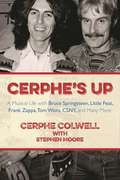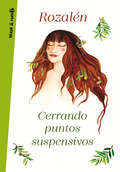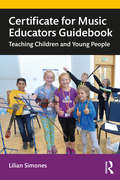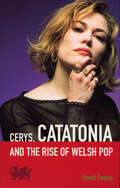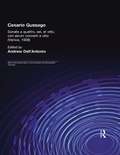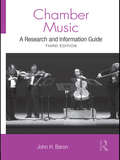- Table View
- List View
Catalog of Pre-1900 Vocal Manuscripts in the Music Library, University of California at Berkeley (UC Publications in Catalogs and Bibliographies #4)
by John A. EmersonThis title is part of UC Press's Voices Revived program, which commemorates University of California Press’s mission to seek out and cultivate the brightest minds and give them voice, reach, and impact. Drawing on a backlist dating to 1893, Voices Revived makes high-quality, peer-reviewed scholarship accessible once again using print-on-demand technology. This title was originally published in 1988.
Catch a Wave: The Rise, Fall, and Redemption of the Beach Boys' Brian Wilson
by Peter Ames CarlinNow the subject of the movie Love & Mercy, starring John Cusack! Brian, Carl, and Dennis Wilson, along with Mike Love and Al Jardine--better known as the Beach Boys--rocketed out of a working-class Los Angeles suburb in the early sixties, and their sun-and-surf sound captured the imagination of kids across the world. In a few short years, they rode the wave all the way to the top, standing with the Beatles as one of the world's biggest bands. Despite their utopian visions, infectious hooks, and stunning harmonies, the Beach Boys were beset by drug abuse, jealousy, and terrifying mental illness. In Catch a Wave, Peter Ames Carlin pulls back the curtain on Brian Wilson, one of popular music's most revered luminaries, as well as its biggest mystery. Drawing on hundreds of interviews and never-before heard studio recordings, Carlin follows the Beach Boys from their earliest days through Brian's deepening emotional problems to his triumphant re-emergence with the release of Smile, the legendarily unreleased album he had originally shelved.
Categorizing Sound: Genre and Twentieth-Century Popular Music
by David BrackettCategorizing Sound addresses the relationship between categories of music and categories of people: in other words, how do particular ways of organizing sound become integral parts of whom we perceive ourselves to be and of how we feel connected to some people and disconnected from others? Through a series of case studies ranging from the race music and old-time music of the 1920s through country and R&B of the 1980s, David Brackett explores the process of "gentrification" through which these genres are produced. Using in-depth archival research and sophisticated theorizing about how musical categories are defined, Brackett has produced a markedly original work.
Cathy Berberian: Pioneer Of Contemporary Vocality
by Pamela Karantonis Francesca Placanica Pieter VerstraeteCathy Berberian (1925-1983) was a vocal performance artist, singer and composer who pioneered a way of composing with the voice in the musical worlds of Europe, North America and beyond. As a modernist muse for many avant-garde composers, Cathy Berberian went on to embody the principles of postmodern thinking in her work, through vocality. She re-defined the limits of composition and challenged theories of the authorship of the musical score. This volume celebrates her unorthodox path through musical landscapes, including her approach to performance practice, gender performativity, vocal pedagogy and the culturally-determined borders of art music, the concert stage, the popular LP and the opera industry of her times. The collection features primary documentation-some published in English for the first time-of Berberian’s engagement with the philosophy of voice, new music, early music, pop, jazz, vocal experimentation and technology that has come to influence the next generation of singers such as Theo Bleckmann, Susan Botti, Joan La Barbara, Rinde Eckert Meredith Monk, Carol Plantamura, Candace Smith and Pamela Z. Hence, this timely anthology marks an end to the long period of silence about Cathy Berberian’s championing of a radical rethinking of the musical past through a reclaiming of the voice as a multifaceted phenomenon. With a Foreword by Susan McClary.
Cavalier Giovanni Battista Buonamente: Franciscan Violinist
by Peter AllsopGiovanni Battista Buonamente was among the most original and inventive Italian composers of the seventeenth century. Peter Allsop reveals his importance as part of a tradition that stands in direct antithesis to that of the Corellian sonata today regarded as the 'norm'. This development is traced in a series of likely teacher-pupil relationships from Salamone Rossi to Marco Uccellini, the most prolific Italian composers of instrumental ensemble music in the first half of the seventeenth century. The first half of the book sets out what is known of Buonamente's turbulent career as he moved from the courtly environments of the Gonzaga household and Habsburg court to several less auspicious posts at various religious institutions, ending his life as maestro di cappella at the mother house of his order, S. Francesco in Assisi. A fascinating picture emerges of the nature of musical patronage against a background of war and plague in this time of great political instability. The later chapters comprise detailed discussions, supported with over 100 music examples, of the unusually wide range of genres for which Buonamente wrote: sinfonias, free sonatas, sets of variations, canzonas, dances; and he was the first Italian to cultivate the ensemble suite to any extent. The book concludes with an examination of his influence on his probable pupil Marco Uccellini and the interest Buonamente instigated in canonic writing, which was passed via Uccellini to a succession of Modenese composers.
Celebrate Jesus: The Stories Behind Your Favorite Praise and Worship Songs
by Shari Macdonald Phil ChristensenThis sequel to the best-selling Our God Reigns tells the stories behind favorite praise and worship songs like "Ancient of Days"; "I Stand in Awe"; "Change My Heart, O God"; and "Awesome God. "
Celebrating Bird: The Triumph of Charlie Parker
by Gary GiddinsWithin days of Charlie &“Bird&” Parker&’s death at the age of thirty-four, a scrawled legend began appearing on walls around New York City: Bird Lives. Gone was one of the most outstanding jazz musicians of any era, the troubled genius who brought modernism to jazz and became a defining cultural force for musicians, writers, and artists of every stripe. Arguably the most significant musician in the country at the time of his death, Parker set the standard many musicians strove to reach—though he never enjoyed the same popular success that greeted many of his imitators. Today, the power of Parker&’s inventions resonates undiminished; and his influence continues to expand.Celebrating Bird is the groundbreaking and award-winning account of the life and legend of Charlie Parker from renowned biographer and critic Gary Giddins, whom Esquire called &“the best jazz writer in America today.&” Richly illustrated and drawing primarily from original sources, Giddins overturns many of the myths that have grown up around Parker. He cuts a fascinating portrait of the period, from Parker&’s apprentice days in the 1930s in his hometown of Kansas City to the often difficult years playing clubs in New York and Los Angeles, and reveals how Parker came to embody not only musical innovation and brilliance but the rage and exhilaration of an entire generation.Fully revised and with a new introduction by the author, Celebrating Bird is a classic of jazz writing that the Village Voice heralded as &“a celebration of the highest order&”—a portrayal of a jazz virtuoso whose gargantuan talent was haunted by his excesses and a view into the ravishing art of one of jazz&’s most commanding and remarkable figures.
Celestial Bodies: How to Look at Ballet
by Laura JacobsA distinguished dance critic offers an enchanting introduction to the art of balletAs much as we may enjoy Swan Lake or The Nutcracker, for many of us ballet is a foreign language. It communicates through movement, not words, and its history lies almost entirely abroad--in Russia, Italy, and France. In Celestial Bodies, dance critic Laura Jacobs makes the foreign familiar, providing a lively, poetic, and uniquely accessible introduction to the world of classical dance. Combining history, interviews with dancers, technical definitions, descriptions of performances, and personal stories, Jacobs offers an intimate and passionate guide to watching ballet and understanding the central elements of choreography.Beautifully written and elegantly illustrated with original drawings, Celestial Bodies is essential reading for all lovers of this magnificent art form.
Celia Cruz, Queen of Salsa
by Veronica Chambers Julie MarenEveryone knows the flamboyant, larger-than-life Celia Cruz, the extraordinary salsa singer who passed away in 2003, leaving millions of fans brokenhearted. Indeed, there was a magical vibrancy to the Cuban salsa singer. To hear her voice or to see her perform was to feel her life-affirming energy deep within you. Relish the sizzling sights and sounds of her legacy in this glimpse into Celia’s childhood and her inspiring rise to worldwide fame and recognition as the Queen of salsa. Her inspirational life story is sure to sweeten your soul.
Celia y Eva: Guerra de Likes
by Celia Dail Eva IbáñezEl libro de las musical.ly más potentes del momento. Una novela repleta de amor, amistad y un pequeño gran misterio por resolver. ¡Ah! Y por supuesto, todo ello envuelto con mucha música. <P><P>Eva y Celia no se conocen, pero tienen sueños muy parecidos. A las dos les encanta la música, la moda y son muy activas en redes sociales. <P>Aunque sus canales no terminan de despegar del todo, se imaginan compartiendo sus canciones, sus gustos y sus inquietudes con miles de seguidores. Un día, sus destinos y sus voces se cruzan por casualidad en una parada de autobús. La cámara de un móvil graba el momento y lo que tanto tiempo han querido se convierte en realidad. <P>Amistad, seguidores, popularidad... ¡Lo tienen todo! <P>Pero justo en lo mejor del sueño, dos chicos misteriosos empiezan a hacerles sombra. ¿Quiénes son, y qué quieren esos dos imitadores que amenazan con arrebatarles seguidores? <P>A Eva y Celia les ha costado mucho llegar donde están, y están dispuestas a defenderlo de quien sea y como sea... ... aunque para ello tengan que librar una auténtica guerra de likes.
Cellist in Exile: A Portrait of Pablo Casals
by Bernard TaperThe cellist in exile is, of course, Pablo Casals, one of the noble figures of the century, who is aptly described here by Bernard Taper as that rarity—an artist with a sense of commitment to humanity.”The book is informal, deeply personal, and permeated with Mr. Taper’s own wonder and affection for his subject. Sensitive, perceptive, and lucid, Cellist in Exile captures the flavor of a unique personality. The book reveals Casals as he is today—still playing the cello inimitably at the age of eighty-five, still stubbornly asserting the moral tenets which have shaped his life—and shows him in the setting of Puerto Rico, which has been his home for the past few years and is his present place of exile. At the same time the book, without being a formal biography, succeeds in re-creating for the reader a vivid sense of Casals’ long, intense, rich, and purposeful life.In preparing this work, Mr. Taper enjoyed a number of conversations with Casals at his home, talks about a whole gamut of subjects—music, freedom, nature, peace, and the Catalonian homeland that Casals still yearns for after more than two decades in exile.As expanded from the widely acclaimed Profile in The New Yorker, Mr. Taper’s book shows Casals in many moods and many different activities—rehearsing, playing the cello, early morning walks along the beach, and at home with his attractive young wife. He is seen in playful imitation of a novice performer’s nervousness when attempting a quavering line Schubert, a scene then heightened by Casals’ confession of the acute nervousness he has suffered before every one of the performances in his own triumphant career. Mr. Taper conveys the cellist’s warmth and simplicity when working with other famed musicians and the kind of communion in music shared with the members of his Casals’ Festival Orchestra.Beautifully illustrated throughout with numerous photographs, some of which had never before been published.
Cello: A Journey Through Silence to Sound
by Kate KennedyA cello has no language, yet it possesses a vocabulary wide enough to tell, bear witness, and make connections across time and continents, which is brought to life in this brilliant new book. In this luminous narrative, Kate Kennedy, a writer and cellist herself, weaves together the story of four cellists who suffered various forms of persecution, injury, and misfortune. The stories are those of the forgotten Jewish cellist Pal Hermann, who is likely to have been murdered by the Nazis in Lithuania during the Holocaust; Lise Cristiani, another forgotten performer, who is considered to be the first female professional cello soloist and who embarked on an epic concert tour of Siberia in the 1850s taking with her a Stradivarius cello that can be seen to this day in a museum in Cremona in northern Italy; Anita Lasker-Wallfisch, who played in the orchestra at Auschwitz and survived spells in both that camp and in Bergen-Belsen; and Amedeo Baldovino of the Trieste piano trio, whose 'Mara' Stradivarius was lost in a shipwreck in the River Plate between Buenos Aires and Uruguay but later recovered from the water and repaired. Interwoven with these remarkable and often moving stories are a series of 'detours' that offer a foil to these remarkable lives. Cello examine the themes explored in the narratives from different perspectives, drawing together historical research, personal experience, and interviews and encounters with contemporary cellists in this unique book that will resonate long after the final page.
Celluloid Symphonies: Texts and Contexts in Film Music History
by Julie HubbertCelluloid Symphonies is a unique sourcebook of writings on music for film, bringing together fifty-three critical documents, many previously inaccessible. It includes essays by those who created the music—Max Steiner, Erich Korngold, Jerry Goldsmith, Elmer Bernstein and Howard Shore—and outlines the major trends, aesthetic choices, technological innovations, and commercial pressures that have shaped the relationship between music and film from 1896 to the present. Julie Hubbert’s introductory essays offer a stimulating overview of film history as well as critical context for the close study of these primary documents. In identifying documents that form a written and aesthetic history for film music, Celluloid Symphonies provides an astonishing resource for both film and music scholars and for students.
Celtic Music and Dance in Cornwall: Cornu-Copia (SOAS Studies in Music)
by Lea HagmannFocusing on the Cornish Music and Dance Revival, this book investigates the revivalists’ claims about Cornwall’s cultural distinctiveness and Celtic heritage, both which are presently used as arguments to promote the English county’s political status as an independent Celtic nation. The author describes two different revival movements that aim at reviving Cornwall’s culture but seem to have entirely different ideas about the concept of authentic Celto-Cornish music and dance. In the first part, historical sources connect Cornwall to its Celtic roots, with an analysis of how the early Cornish revivalists used, changed and adapted this material during the 1980s in order to create a Celto-Cornish revival corpus. In the second part, the book addresses the desire of the Cornish people to express their local and Celtic identities through music and dance, and various practices musicians and dancers have developed to do so. The Nos Lowen movement, which started in the year 2000, is important in this study because it has expanded and newly interpreted the concepts of ‘traditional’, ‘Celtic’ and ‘authentic’.
Censorship Now!!
by Ian F. Svenonius"While putting a copy of this book on your nightstand would be a sign of good taste, who cares about good taste? Are you willing to be seen reading a book titled Censorship Now!! in public? If so, your skin might burn with funny glances from squares, scolds and looky-loos. But on the inside, you'll feel your brain throbbing as it swells to accommodate some hilarious, absurd and radical new strategies on how to live in our ridiculous world."--Washington Post"Svenonius' new book is Censorship Now!!, and the title alone shows just how provocative the author can be. A collection of essays previously published by Vice, Jacobin, and others, it sets up numerous enemies--both real and straw--for Svenonius to knock down....It's all couched in a style that's part anarchist tirade, part postmodern critique, and part punk-rock snottiness--yet it's addictively ridiculous."--NPR"Censor it all. Film, TV, music, politics, books, news, art--censor all of it. That's the guiding principle of local radical punk Ian Svenonius' latest essay collection, Censorship Now!!"--Washington City Paper, Critics' PickNamed a Favorite Book of 2015 by Jason Diamond at Vol. 1 Brooklyn"Gonzo ecstasy for those who have come to know Svenonius's self-aware political meditations....And though the essays Svenonius writes are not themselves unclear, the process of talking about what he's written involves discussions that some might find uncomfortable. His books make more sense the more you dissect them. So keep them in your back pocket and read them, one word at a time."--Los Angeles Review of Books"A new collection of essays by everyone's favorite supercilious rock theorist...Svenonius has always been the smartest kid in the room....In print, Svenonius is like that curmudgeonly pal that you adore because, even while his insight quivers between humor, paranoia, and antisocial ire, he never dispels your fascination in how he gets there."--SF Weekly"Ian Svenonius is best known as the frontman of bands like the Make-Up and Nation of Ulysses, but he's also a brilliant cultural critic with a talent for coming up with the hottest takes you'll ever read. In this collection, Svenonius makes compelling arguments in favor of censorship and hoarding books and records, amid polemics against Apple and Ikea, the yuppification of indie rock, and the shaving of pubic hair."--Buzzfeed"The essays in Censorship Now!! are equally packed with modest proposals and mock-revolutionary rhetoric, but there are grains of truth in pieces like 'The Historic Role Of Sugar In Empire Building' and 'Heathers Revisited: The Nerd's Fight For Niceness'--they're just buried somewhere between tongue and cheek."--The A.V. Club"Censorship Now!! simultaneously deals in the heated rhetoric of insurgent calls to action, the seductive broad strokes of propaganda, and the clever winking of surrealist humor. Often when I'm really convinced Svenonius has gone off a paranoid deep end, the next sentence hits back with knowingly-hilarious exaggeration or profoundly spot-on analysis, realigning my perspective and making me wonder again....It's fitting that a book whose intentions are ambiguous begins with a call to censor art and ends by letting art do the talking."--PitchforkIan F. Svenonius's new collection of sixteen essays and stories, entitled Censorship Now!!, is reorganizing people's ideas about censorship, Ikea, documentary filmmaking, the Berlin Wall, the film Heathers, the twist, the frug, the mashed potato, shaving one's body, Apple, Inc., Nordic functionalism, the supposed benevolence of the Wikipedia, hoarding, college rock, the origins of the Internet, and more. It's an underground smash which has been met with a horrified gasp in all respectable quarters and gog-eyed enthusiasm in artist garrets the world over.
Central European Folk Music: An Annotated Bibliography of Sources in German (Routledge Music Bibliographies #Vol. 3)
by Philip V. BohlmanFirst Published in 1996. Routledge is an imprint of Taylor & Francis, an informa company.
Century of Song: 101 Songs that Shaped American Music
by Noah LefevreDiscover the Music that Changed EverythingEmbark on a complex and inspiring journey through the last 101 years as told through some of the most memorable hits and the artists behind them.Noah Lefevre, creator of Polyphonic, explores how our favorite music does more than entertain. From Aretha Franklin carving out her own space in what had been considered a man’s world by reworking the chauvinistic lyrics to the 1967’s hit “Respect,” to Doja Cat’s successful backlash against toxic fans of the digital age; from a broken amplifier on “Rocket 88” ushering in the distorted sounds of rock n’ roll, to Kendrick Lamar’s release of “Alright,” which became the unofficial anthem to the BLM protests—each song mirrors the strife, change and progress of our country’s narrative. In this rich and engrossing guide for music lovers everywhere, you’ll discover how a single song can make history.
Cerphe's Up: A Musical Life with Bruce Springsteen, Little Feat, Frank Zappa, Tom Waits, CSNY, and Many More
by Stephen Moore Cerphe ColwellCerphe's Up is an incisive musical memoir by Cerphe Colwell, a renowned rock radio broadcaster for more than forty-five years in Washington, DC. Cerphe shares his life as a rock radio insider in rich detail and previously unpublished photographs. His story includes promotion and friendship with a young unknown Bruce Springsteen; his years at radio station WHFS 102.3 as it blossomed in a new freeform format; candid interviews with Little Feat's Lowell George, Tom Waits, Nils Lofgren, Stevie Nicks, Crosby, Stills & Nash, Steven Van Zandt, Robert Plant, Danny Kortchmar, Seldom Scene's John Duffey, and many others; hanging out with George Harrison, the Rolling Stones, Van Morrison, John Entwistle, Jackson Browne, and many more; testifying on Capitol Hill with friend Frank Zappa during the "Porn Rock" hearings; and managing the radio syndication of both G. Gordon Liddy and Howard Stern. Player listings and selected performances at legendary DC music clubs Childe Harold and Cellar Door are also chronicled.Cerphe's Up is both historically significant and a fun, revealing ride with some of the greatest rock-and-roll highfliers of the twentieth century. Cerphe's Up belongs on the reading list of every rock fan, musician, and serious music scholar.
Cerrando puntos suspensivos
by RozalénCantautora de primera línea, talentosa y comprometida, Rozalén nos regala una libre y honesta recopilación de reflexiones acerca de los momentos y situaciones más emocionantes e importantes de los últimos años. Los puntos suspensivos son finales abiertos y este libro, este inventario de recuerdos, es el punto y seguido que todos necesitamos para seguir adelante. En estas páginas se grita, se piensa, se reflexiona y se cuentan los silencios que hay detrás de cada sentimiento, de cada experiencia que Rozalén ha vivido en estos últimos años. En prosa y sin prisa, María se quita el paraguas que todos llevamos de serie y, sin cinturón de seguridad, deja que las palabras resbalen por su muñeca para contar y vivir con quien quiera leerlo todo lo que le llueve dentro, para compartirlo con cada lector que tenga el valor de mojarse.
Certificate for Music Educators Guidebook: Teaching Children and Young People
by Lilian Lima SimonesCertificate for Music Educators Guidebook is focused on the learning outcomes of the Certificate for Music Educators in the UK, accredited by the Office of Qualifications and Examinations Regulation (Ofqual), and validated by Trinity College London (TCL) and the Associated Board of the Royal Schools of Music (ABRSM).Through reflective questions, readers become acquainted with research findings relevant to teaching children and explore ways for enacting best teaching practice in day-to-day teaching. It offers strong foundations in teaching music in contemporary diverse settings, in both instrumental and vocal teaching; early years, primary and secondary schools and community-based contexts.This book is directly aligned with the CME Level 4 course modules, units and areas of study and its desired learning outcomes. It is a key companion for students enrolled in a validated centre, as well as the teachers and mentors involved in the design and delivery of the CME.
Cerys, Catatonia And The Rise Of Welsh Pop
by David OwensIn the late nineties, Wales (is) the centre for guitar bands in the UK so says John Robb in THE NINETIES and with bands as strikingly fresh and individual as Catatonia Welsh denomination looks assured. It has taken Catatonia eight years of hard work and persistance to gain the recognition and adulation that they so richly deserve, but finally Cerys' searing vocals and lilting guitar pop have made the breakthrough. Hardly surprisingly really, considering the wealth of talent that is Catatonia and the crest of the Welsh wave they are so assuredly riding. But as anyone will tell you, what makes Catatonia different from the rest, the Manic Street Preachers, Stereophonics and others, is Cerys. Cerys Matthews is fast becoming an icon in herself - a combination of sweetness and South Walesian toughness that is proving to be so endearing to her legion of fans. Often likened to Blondie, Cerys has graced more magazine covers than you care to mention, yet she is the sort of pop star who still sends away for free tights. This book will be the first to chart the rise and yet further rise of Catatonia, from Cerys busking outside Debenhams in Cardiff to their new found fame.
Cesario Gussago. Sonate a quattro, sei, et otti (Italian Instrumental Music of the Sixteenth and Seventeenth Centuries #20)
by Andrew Dell'AntonioFirst Published in 1994. Routledge is an imprint of Taylor & Francis, an informa company.
Chaliapin An Autobiography as told to Maxim Gorky
by James Hanley Nina FroudFeodor Ivanovich Chaliapin (1873-1938) was a Russian bass who was famous for his singing and his acting in opera. This book covers is life to 1915 and primarily consists of his reminiscences of childhood and early singing career as told to Maxim Gorky. The last third of the book contains correspondence and early appraisals of his singing and a list of early performances.
Chamber Music: A Research and Information Guide (Routledge Music Bibliographies)
by John H BaronChamber Music: A Research and Information Guide is a reference tool for anyone interested in chamber music. It is not a history or an encyclopedia but a guide to where to find answers to questions about chamber music. The third edition adds nearly 600 new entries to cover new research since publication of the previous edition in 2002. Most of the literature is books, articles in journals and magazines, dissertations and theses, and essays or chapters in Festschriften, treatises, and biographies. In addition to the core literature obscure citations are also included when they are the only studies in a particular field. In addition to being printed, this volume is also for the first time available online. The online environment allows for information to be updated as new research is introduced. This database of information is a "live" resource, fully searchable, and with active links. Users will have unlimited access, annual revisions will be made and a limited number of pages can be downloaded for printing.
